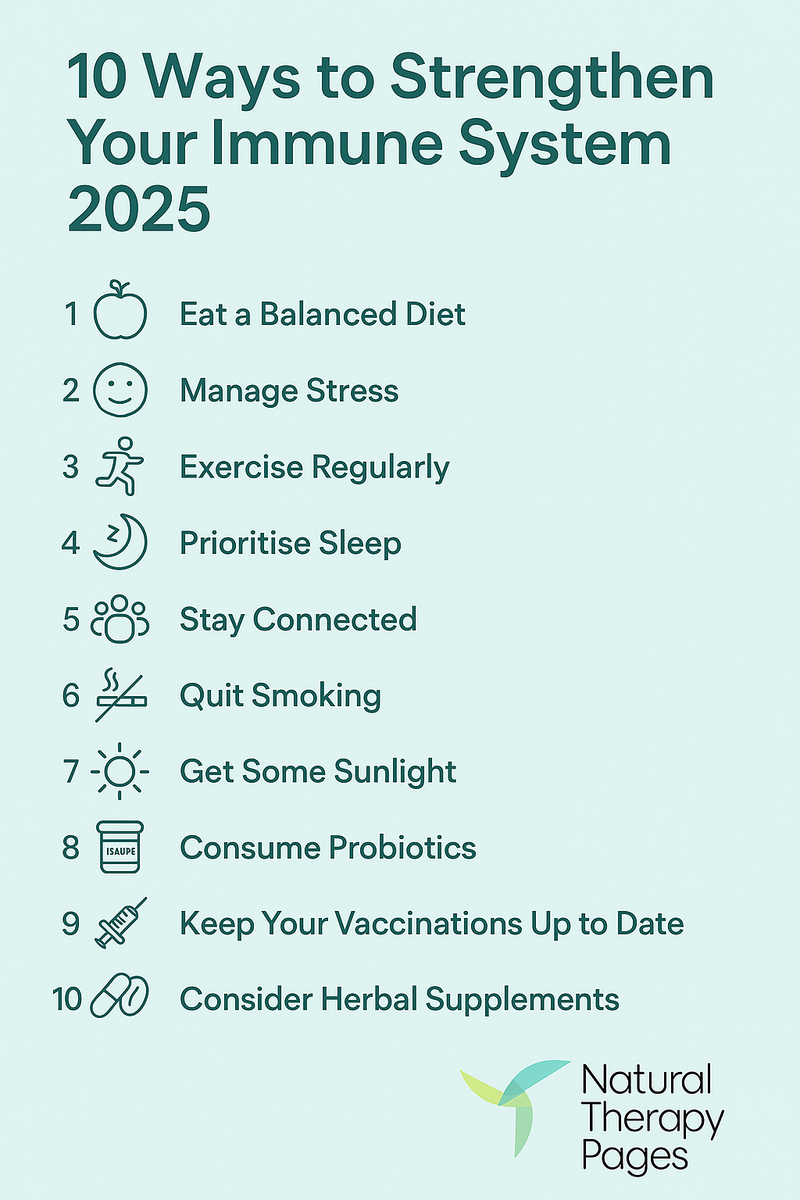
Keeping your immune system strong is one of the best ways to protect your body from infections, viruses, and chronic diseases. Your immune system works tirelessly behind the scenes—fighting off harmful bacteria, identifying threats, and helping your body recover from illness. When it's running at its best, you're more likely to stay healthy, bounce back faster, and feel energised day to day.
The good news? You don’t need to rely on quick fixes or complicated regimens. Simple everyday habits—from what you eat to how you sleep, move, and manage stress—can make a big difference. Complementing these with natural therapies, supplements, and mindful self-care can further strengthen your body’s natural defences.
Below are 10 evidence-based strategies to help support your immune health—recommended by health professionals and backed by science.
1. Eat a balanced, nutrient-rich diet
A healthy immune system starts with good nutrition. Your body needs a steady supply of vitamins, minerals, and antioxidants to fuel the immune response. Eating a variety of colourful fruits and vegetables, whole grains, legumes, lean protein, and healthy fats helps strengthen your defences.
Focus on:
-
Vitamin C (found in citrus, capsicum, and broccoli)
-
Zinc (in nuts, seeds, and legumes)
-
Iron (in leafy greens, red meat, and tofu)
-
Probiotics (in yoghurt and fermented foods)
A consistent, nutrient-rich diet lays the foundation for everything else your immune system needs to function properly.
2. Stay physically active
Regular movement helps your immune cells travel through your body more efficiently. It also reduces inflammation and supports overall cardiovascular and mental health.
You don’t need intense workouts to see results. Moderate activity like walking, swimming, dancing, or cycling for 30 minutes a day is enough to make a difference. Exercise also supports better sleep and reduces stress, both of which benefit immune function.
Making physical activity part of your daily routine keeps your immune system sharp and responsive.
3. Prioritise good sleep
Sleep gives your body time to recover, regulate hormones, and create immune-supporting proteins called cytokines. Adults need around 7 to 9 hours of quality sleep each night for optimal immune function.
Poor sleep can increase your chances of catching viruses and may slow down recovery. If you struggle to sleep well, consider limiting screen time before bed, avoiding caffeine late in the day, and keeping a consistent bedtime routine.
By improving your sleep habits, you give your immune system the recovery time it needs to do its job effectively.
4. Reduce stress
Chronic stress suppresses immune activity and raises cortisol levels, which can interfere with your body’s natural defences. While you can’t eliminate stress entirely, you can manage it in healthy ways.
Try deep breathing, meditation, journalling, or regular time in nature. Even taking short breaks during the day can help reset your nervous system. Staying socially connected also plays a big role in emotional well-being and immune strength.
Supporting your mental health helps your body stay resilient physically.
5. Get sunlight (for vitamin D)
Vitamin D plays a key role in regulating immune responses. In Australia, sunlight is the best natural source. Spending 10 to 30 minutes outdoors on most days, especially in the morning or late afternoon, can help your body produce enough vitamin D.
Just be sure to follow sun safety practices during peak UV hours, especially in summer. If you’re indoors often or it's winter, talk to your GP about supplements or a vitamin D test.
A healthy level of vitamin D makes your immune system more capable of handling viral infections and inflammation.
6. Focus on gut health
About 70% of your immune system is located in your gut. A well-balanced microbiome helps control inflammation and supports a healthy immune response.
Eat plenty of fibre-rich plant foods (like whole grains, legumes, and veggies) and include probiotic foods like yoghurt, kimchi, and miso. Staying hydrated also supports digestion and nutrient absorption.
Improving your gut health strengthens your first line of defence against illness.
7. Limit alcohol and avoid smoking
Excessive alcohol weakens your body’s ability to fight off infections, while smoking damages lung tissue and disrupts immune cell function. Both habits increase your risk of respiratory illness and slow recovery times.
Cutting back on alcohol and quitting smoking are two of the most impactful changes you can make for your immune system. Support is available if you need help making the switch.
These changes don’t just boost your immunity—they benefit nearly every system in your body.
8. Stay socially connected
Social connection isn’t just good for your mood—it’s also linked to stronger immunity. Isolation and loneliness increase stress hormones and inflammation, both of which can suppress your body’s natural defences.
Catch up with loved ones, join a local club or hobby group, or volunteer in your community. Even regular chats over the phone can make a difference.
Maintaining strong relationships helps you stay both emotionally and physically well.
9. Stay up to date with vaccinations
Vaccinations are a key part of immune health. They help your body build a memory of how to fight specific infections, so if you’re exposed in the future, your immune system can respond faster and more effectively. Vaccines protect against serious illnesses such as influenza, tetanus, whooping cough, and COVID-19.
For women, certain vaccinations are particularly important during different life stages — including pregnancy, which may require updated protection against whooping cough and influenza to safeguard both mother and baby. HPV vaccination is also strongly recommended for younger women to reduce the risk of cervical cancer.
You can speak to your GP or health provider about:
-
Reviewing your immunisation history
-
Scheduling catch-up vaccines if needed
-
Getting boosters for travel or pregnancy
-
Ensuring children’s and family members’ vaccinations are current
You can find current vaccine recommendations from the Department of Health and Aged Care.
Staying up to date with immunisations is one of the easiest and most effective ways to support your immune system.
10. Explore natural immune support (safely)
Herbs and supplements can complement a healthy lifestyle when used correctly. Garlic, astragalus, echinacea, and elderberry are some of the herbs commonly associated with immune support.
However, it’s important to speak with a qualified health professional before starting any herbal remedy, especially if you’re pregnant, breastfeeding, or taking medication. Natural therapies can be effective—but only when used with care.
To explore these options safely, find a qualified practitioner near you through our natural health pracitioner in Australia directory.
To summarise, here are the 10 simple things you can do to strengthen and improve your immune system:

Final thoughts
Supporting your immune system doesn’t require drastic or complicated changes — it’s about building a foundation of consistent, everyday habits that nourish your body and mind. Eating a diverse, nutrient-rich diet gives your immune cells the fuel they need to function, while regular movement helps them circulate efficiently. Prioritising quality sleep and managing daily stress also play a critical role in keeping your immune defences strong and responsive.
While these strategies work well for most people, individual needs can vary depending on your age, health status, or lifestyle. That’s why it’s worth speaking with a GP, naturopath, or accredited nutritionist if you want personalised guidance. They can help you identify areas to improve, recommend safe supplements if needed, and ensure you're making the best choices for long-term health and wellness.









